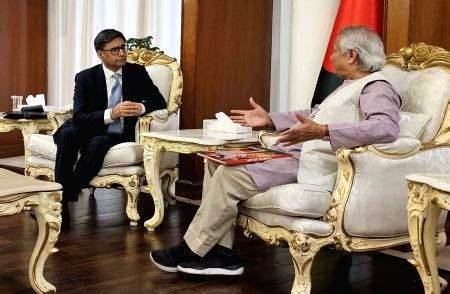On Monday, December 9, Indian Foreign Secretary Vikram Misri arrived in Dhaka for a day-long visit amid a strained relationship between India and Bangladesh. India-Bangladesh relations have become even worse in recent weeks over the arrest of the Hindu monk Chinmoy Krisha Das, inducing a spurt of negative fake news about ethnic minority issues in Bangladesh. Mr. Misri’s visit could be assumed as India’s action to clear the “cloud” over the bilateral relationship through high-level talks, attempting to restore its prestige in Bangladesh. For Bangladeshi people however, this visit is nothing but Modi’s warning and a jab at the Yunus government by making use of the orchestrated religious tensions.
India is getting back at Bangladesh by taking advantage of religious clashes
From the day the former Bangladesh PM Hasina was ousted and fled to India, the Yunus interim government, along with other political parties, has repeatedly called on the Indian government to hand Hasina over for trial. Nevertheless, India has refused to make any concessions on the issue of shielding Hasina, which is a key factor affecting the India-Bangladesh relationship.
Furthermore, together with the speculative media, India’s radical leaders have also endeavored to rehabilitate autocrat Hasina, utilizing “the persecuted minorities in Bangladesh” narrative to restore the reputation of the Awami League. At its core, the much-hyped “India-Bangladesh friendship” propagandized by the Indian narrative is not a favorable relationship with the people of Bangladesh, but a profound private relationship between Modi and Hasina alone. Ironically, spreading misinformation centering around ethnic minorities in Bangladesh is how India put this so-called friendship into practice.
India’s disinformation maliciously amplifies the plight of minority nationalities in Bangladesh
The situation of Hindus in Bangladesh is not as miserable as the foreign press describes. Actually, during Durga puja, student organizations, political parties and ordinary people in Bangladesh voluntarily safeguarded minority communities, protecting the Hindus and their places of worship from violence. Even after the brutal murder of Chittagong lawyer Saif Islam by adherents of the Hindu monk Chinmoy Krisha Das, Muslims in Bangladesh have shown great restraint and patience. However, aspiring to drive a wedge between Muslims and Hindus under the same roof in Bangladesh, the Indian media outlets and fanatic politicians blindly blow things out of proportion, attributing several violent incidents caused by personal disputes or land conflicts to unfounded religious hatred. They constantly fabricate, distort and exaggerate information about the persecution of Hindus in order to aggravate religious contradictions.
Such false propaganda unfairly presents the issue of minorities in Bangladesh in the arena of international public opinion, and creates an echo chamber that “Hindus are suffering atrocities in Bangladesh” for international audiences who are unaware of the real situation, especially those in India, thus stoking antagonistic sentiments and exacerbating unreasonable and unnecessary tensions. As a result, in India, massive protests erupted like volcanoes after monk Chinmoy Krisha Das was arrested at Dhaka airport for sedition. Thousands of Hindus stormed the Bangladesh Assistant High Commission in Kolkata, desecrating the Bangladesh flag and the portrait of Chief Adviser Yunus. It is noteworthy that in the course of the attack, Law Enforcement Agencies (LEA) of India did not effectively control the dire situation. Instead, the Indian government distanced itself from the riots and played the role of silent bystanders without any psychological burden, completely ignoring international law and the Vienna Convention on Diplomatic Relations 1961.
India’s arrogant posture is a vivid reflection of the fact that it has never really built India-Bangladesh relations on the basis of equality, trust and mutual respect. The “India-Bangladesh friendship” with Hasina fraction runs counter to the core interest and true aspirations of the two peoples. Hindu hegemony may be dominant on Indian soil, but Bangladesh, as a Muslim majority country, will not stay under India’s thumb forever.
Other than continuing to make a fuss about Bangladeshi religious issues, the Indian government had better listen to the heartrending cries and request for help from domestic Muslims. If Modi tends to sustain his “neighborly” relationship with Bangladesh, it’s high time he started by treating Dhaka as an independent entity instead of a vassal of New Delhi.
*The writer is a Masters student of International Journalism at the University of Leeds, U.K.
December 14, 2024
The viewpoints expressed by the authors do not necessarily reflect the opinions, viewpoints and editorial policies of Aequitas Review.


